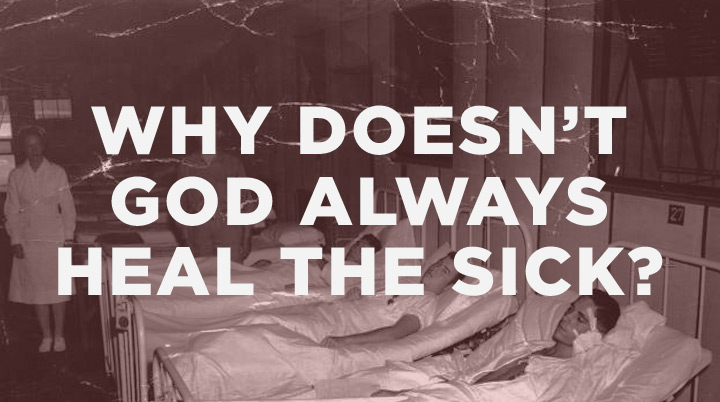Latest
-
Objections to the Christian Faith from the Unchurched and De-Churched
 Tue Dec 02, 2014
Tue Dec 02, 2014
by Resurgence -
Craig Groeschel: We Innovate for Jesus
 Tue Oct 14, 2014
Tue Oct 14, 2014
by Resurgence -
Mark Driscoll: Revelation
 Tue Oct 07, 2014
Tue Oct 07, 2014
by Resurgence -
RESURGENCE LEADERSHIP #034: JOHN PIPER, WHY I TRUST THE SCRIPTURES, PART 2
 Tue Sep 30, 2014
Tue Sep 30, 2014
by Resurgence -
Resurgence Leadership #033: John Piper, Why I Trust the Scriptures, Part 1
 Tue Sep 23, 2014
Tue Sep 23, 2014
by Resurgence

Archives
Why Doesn’t God Always Heal the Sick?

“Three times I pleaded with the Lord about this [thorn], that it should leave me. But he said to me, ‘My grace is sufficient for you, for my power is made perfect in weakness.’” 2 Corinthians 12:8–9
God loved the Apostle Paul. Yet God sovereignly orchestrated Paul’s painful thorn in the flesh and then declined to remove it, notwithstanding Paul’s passionate prayer that he be healed.
We are not apostles. Yet, God loves us as his children no less than he loved Paul. We don’t know the nature of Paul’s thorn, but each of us has undoubtedly suffered in a similar way, and some considerably worse.
We, like Paul, have prayed incessantly to be healed. Or perhaps knowing of a loved one’s “thorn,” we have prayed for him or her. And again, as with Paul, God declined to remove it.
Why?
It’s hard to imagine a more difficult, confusing, and controversial topic than why God chooses not to heal in response to the intercessory pleas of his people. I don’t profess to have all the answers, but I think I’ve got a few.
1. Faith
Occasionally healing does not occur because of the absence of that sort of faith that God delights to honor. This does not mean that every time a person isn’t healed, it is because of a defective faith, as if healing inevitably follows a robust and doubt-free faith. But it does mean that faith is very important.
How can we conclude otherwise in view of the many texts that closely link healing to someone’s faith? I hope you’ll take the time to pause and read these passages: Matthew 9:22, 28–29; 15:28; Mark 2:5, 11; 5:34; 9:17–24; Mark 10:52; Luke 17:19; Acts 3:16; 14:8–10; James 5:14–16.
2. Unconfessed sin
Sometimes healing does not occur because of the presence of sin for which there has been no confession or repentance. James 5:15–16 clearly instructs us to confess our sins to one another and pray for one another that we may be healed.
Again, please do not conclude from this that each time a person isn’t healed it is because he or she has committed but not repented of some specific sin. But in some cases (not necessarily all) this is undoubtedly true.
3. Lack of desire
Odd as it may sound to hear it, healing may not happen because the sick don’t want it to happen. Jesus asked the paralyzed man in John 5:6, “Do you want to be healed?” What on the surface may appear to be a ridiculous question is, on further examination, found to be profoundly insightful.
Some people who suffer from a chronic affliction become accustomed to their illness and to the pattern of life it requires. Their identity is to a large extent wrapped up in their physical disability.
4. Lack of prayer
We must also consider the principle articulated in James 4:2, where we are told, “You do not have, because you do not ask.” The simple fact is that some are not healed because they do not pray. Perhaps they pray once or twice, and then allow discouragement to paralyze their petitions. Prayer for healing often must be prolonged, sustained, persevering, and combined with fasting.
5. Demonic influences not addressed
Some are not healed because the demonic cause of the affliction has not been addressed. Please do not jump to unwarranted conclusions. I am not suggesting that all physical disease is demonically induced.
It is interesting, is it not, that in Paul’s case God used “a messenger of Satan” to inflict the thorn? There is also the case of the woman in Luke 13, who had “a disabling spirit [or, a spirit of infirmity] for 18 years. She was bent over and could not fully straighten herself” (Luke 13:11). According to Jesus, “Satan” had “bound” her (Luke 13:16; see also Acts 10:38).
6. Divine providence
We must also consider the mystery of divine providence. There are undoubtedly times and seasons in the purposes of God during which his healing power is withdrawn or at least largely diminished. God may have any number of reasons for this to which we are not privy, whether to discipline a wayward and rebellious church or to create a greater desperation for his power or to wean us off excessive dependence on physical comfort and convenience or any number of other possibilities. If this leaves you confused, that’s why it’s called a mystery!
7. A better thing
Oftentimes there are dimensions of spiritual growth and moral development and increase in the knowledge of God in us that he desires more than our physical health, experiences that in his wisdom God has determined can only be attained by means or in the midst of or in response to less-than-perfect physical health. In other words, healing the sick is a good thing (and we should never cease to pray for it), but often there is a better thing that can be attained only by means of physical weakness.
Persevere in prayer
We may never know why a person isn’t healed. What, then, ought to be our response?
In the first place, don’t stop praying! Some people find this difficult to swallow. Many times I’ve been asked, why should Paul bother to pray for release from something that God wills to inflict? The answer is that Paul didn’t know what God’s will was in this particular case until such time as God chose to make it known. And neither do you or I with regard to any particular illness we may suffer.
If, like Paul, you are able to discern, through some prophetic disclosure or other legitimate biblical means, that it is not God’s will now or ever to heal you, you may cease asking him to do so. Otherwise, short of death itself, you must persevere in prayer.
I’m sure there are other ways to account for why God chooses not to heal, but I trust that these have proved helpful. There is much I do not know about this matter, but of this I’m quite certain: God’s grace is sufficient in all circumstances so that we, “for the sake of Christ” (2 Cor. 12:10), might learn that in our weakness his power is made perfect!
 In this book, Dr. Storms answers 25 challenging questions Christians are often confused by or maybe even afraid to ask in the first place. For the full response to this question in this post, along with the answers to the 24 other challenging questions, head to the Resurgence Store to pick up your copy of Tough Topics.
In this book, Dr. Storms answers 25 challenging questions Christians are often confused by or maybe even afraid to ask in the first place. For the full response to this question in this post, along with the answers to the 24 other challenging questions, head to the Resurgence Store to pick up your copy of Tough Topics.
This post is an abridged excerpt from Tough Topics, by Sam Storms, copyright © 2013